eTa - efficient transportation alternatives
Research project at a glance

Departments and Instituts
Funding type
Period
01.07.2017 to 30.06.2021
Project Description
Insights into the project and previous public events can be found in the Project Results section.
Scientific results from the project can be found in the publications section.
Der Ausbau nachhaltiger Elektromobilität ist eine der gesellschaftlichen Herausforderungen
unserer Zeit, die im Forschungsprojekt eTa aufgegriffen wird.
The energy efficiency of vehicles is addressed in projects on aerodynamics and optimized operating strategies. In particular, the focus is also on non-classical vehicle concepts. Alternative mobility concepts based on non-fossil energy sources require new supply structures. The optimized expansion of charging infrastructure is therefore another topic. However, even the best mobility concept is useless if it is not accepted by society and implemented by politics and industry. Acceptance issues therefore represent a central element of eTa, which will be further expanded.
Based on the need to reduce energy consumption, the following areas will be addressed as a priority:
- Vehicle efficiency
- Alternative mobility concepts
- Efficiency of mobility concepts
- Technology acceptance
In particular, these are questions which arise only from the combined consideration of these subject areas and are usually not fully answered in classical manner. Examples of this are
- optimization of hybrid controls for muscle-electric hybrid light vehicles
- and study of the aerodynamics of ultralight vehicles where results of the classic wind tunnel tests often do not correspond to the results of the practice.
Other topics that we are dealing with are
- predictive operational strategies for electric combustion hybrid vehicles and loss optimization,
- optimization of multi-stage placement of charging stations,
- acceptance of alternative mobility concepts.
2018

Melanie Ludwig, Katrin Hoffmann, Stefan Endler, Alexander Asteroth, and Josef Wiemeyer (2018). Measurement, Prediction, and Control of Individual Heart Rate Responses to Exercise—Basics and Options for Wearable Devices. Frontiers in physiology, 9.
Preliminary work in the thematic context of eTa
2017
- Christina Pakusch, and Paul Bossauer. User Acceptance of Fully Autonomous Public Transport. In Proceedings of the 14th International Joint Conference on e-Business and Telecommunications - Volume 4: ICE-B, (ICETE 2017) ISBN 978-989-758-257-8, pages 52-60. DOI: 10.5220/0006472900520060
Honored with the Best Paper Award.
2016
- Melanie Ludwig, Harald Grohganz, and Alexander Asteroth. A Convolution Model for Heart Rate Prediction in Physical Exercise. In Proceedings of the 4th International Congress on Sport Sciences Research and Technology Support (icSPORTS 2016), pages 157-164. DOI: 10.5220/0006030901570164
- Melanie Ludwig, David Schaefer, and Alexander Asteroth. Training Simulation with Nothing but Training Data - Simulating Performance based on Training Data Without the Help of Performance Diagnostics in a Laboratory. In Proceedings of the 4th International Congress on Sport Sciences Research and Technology Support (icSPORTS 2016), pages 75-82. DOI: 10.5220/0006042900750082
- Melanie Ludwig and Alexander Asteroth. Predicting performance from outdoor cycling training with the fitness-fatigue model. In Proceedings dvs-Workshop Modelling in Endurance Sports, pages 3–6. KOPS – The Institutional Repository of the University of Konstanz, 2016. URI: http://nbn-resolving.de/urn:nbn:de:bsz:352-0-371586.
Results
Insights into the project
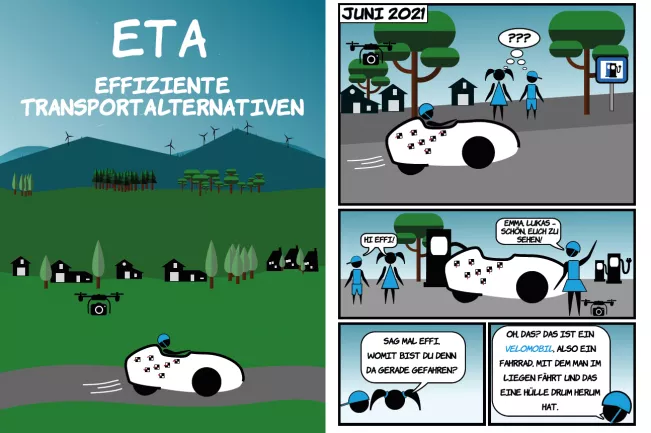
As part of the 2018 eTa event series, PhD student Melanie Ludwig designed a comic book for children that illustrates the goals of the three eTa startup projects in a clear and understandable way.
Public events 2018
Museum Mile Festival
The eTa project was a guest at the Deutsches Museum Bonn as part of the Museumsmeilenfest from May 31 to June 3, 2018. On four days, the scientists had the opportunity to present their research to interested visitors.
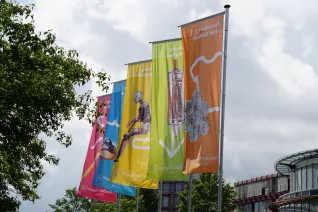
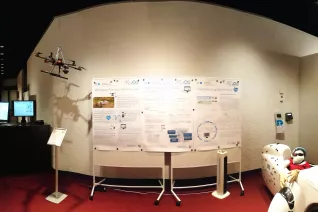
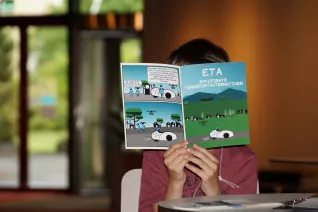
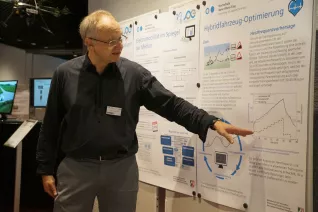
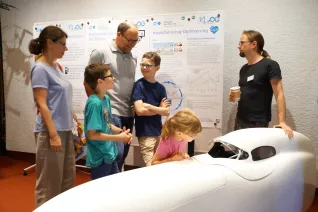
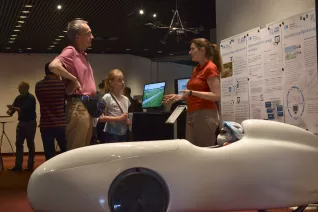
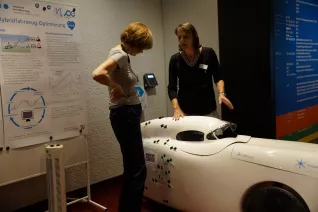
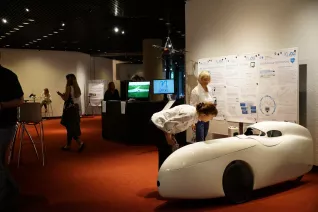
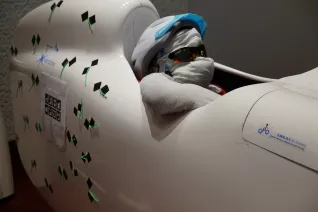
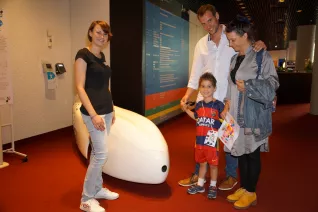
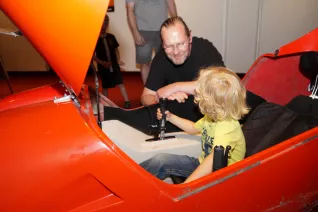
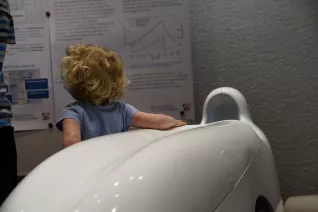
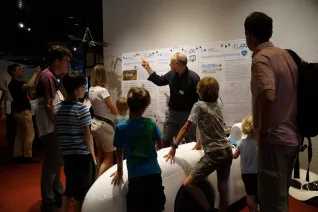
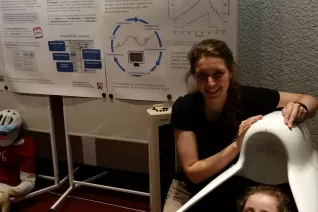
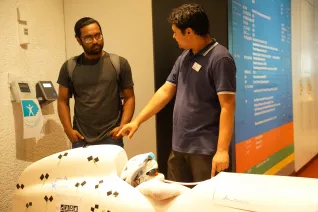
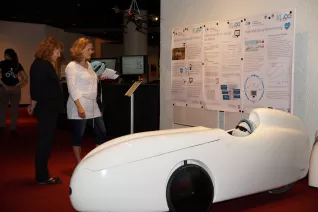
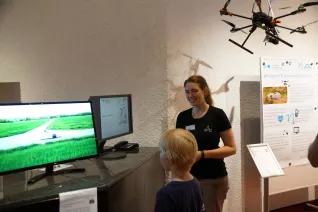

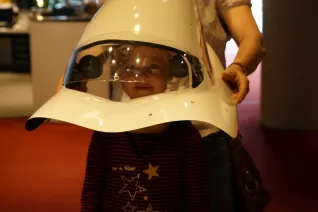
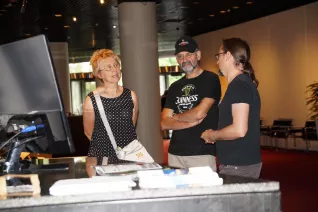
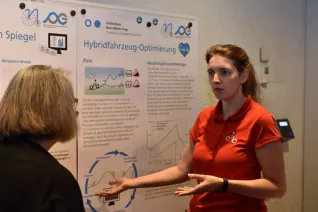
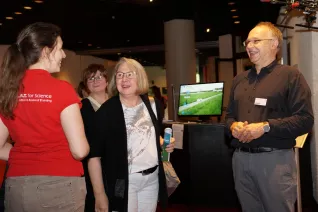
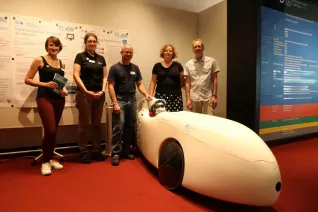
Open House at Villa Hammerschmidt
On July 24, 2018, Federal President Frank-Walter Steinmeier invited several scientific institutions in the region to an open day at Villa Hammerschmidt. The Bonn-Rhein-Sieg University of Applied Sciences and the scientists* of the eTa research project were also there, answering the questions of the Federal President and his wife Elke Büdenbender about the highly efficient research velomobiles they had brought along. They were also available to answer questions from other guests from the interested public.
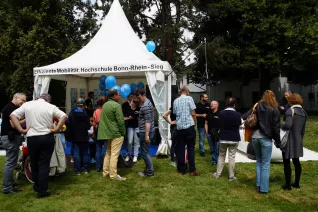
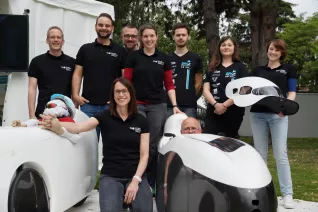
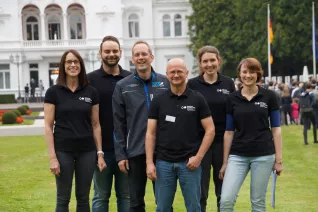
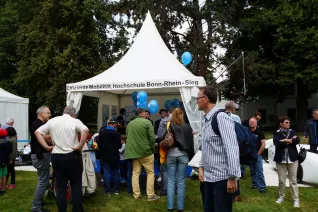
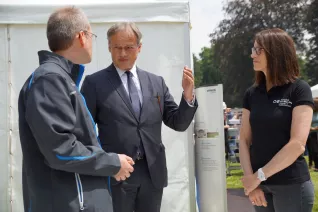
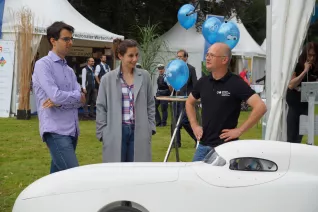
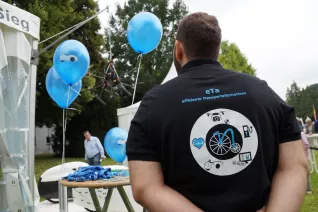
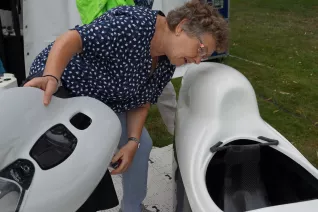
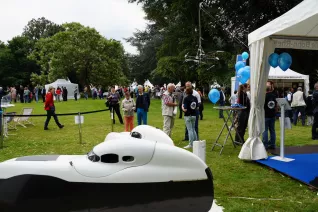
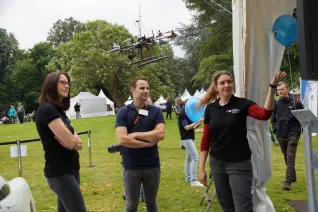
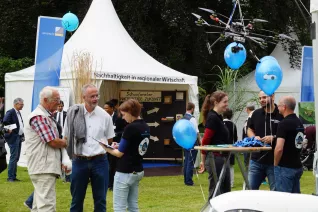
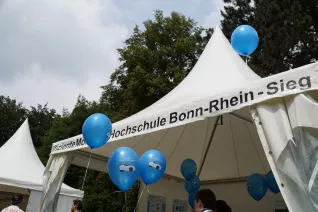
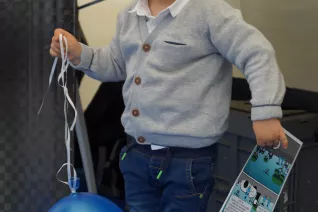
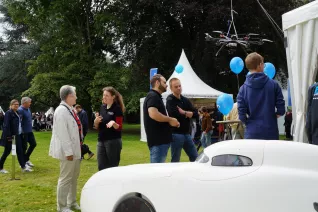
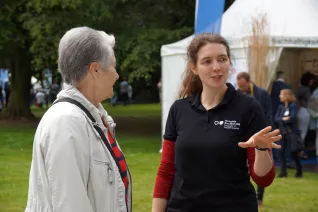
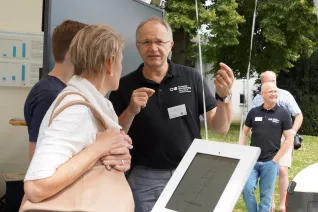
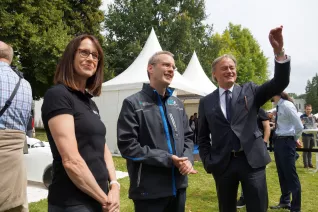
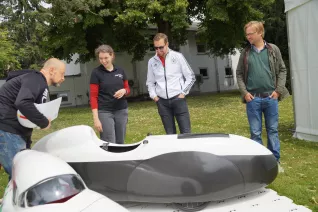
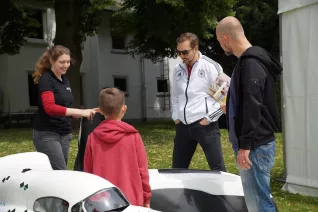
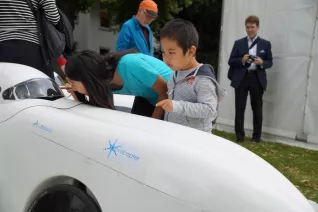
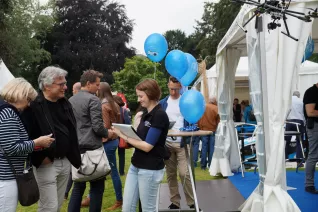
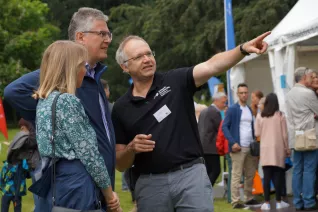
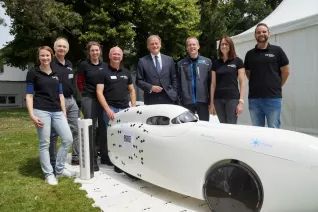
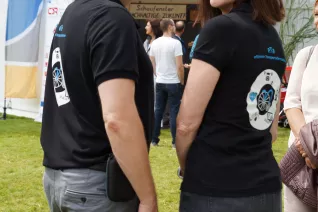
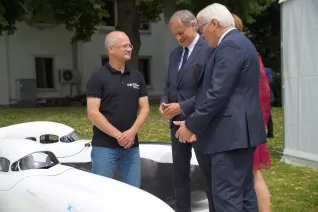
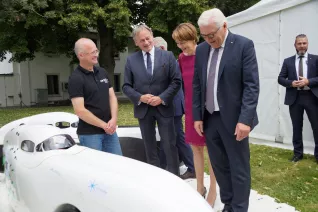
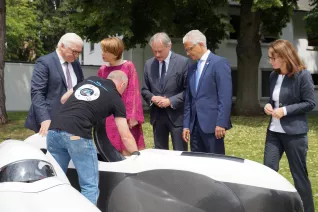
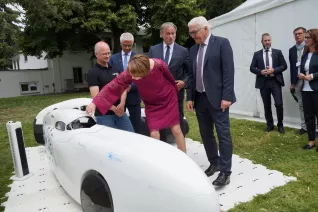
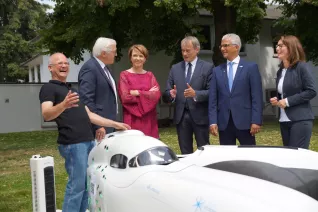
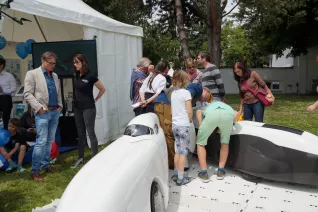
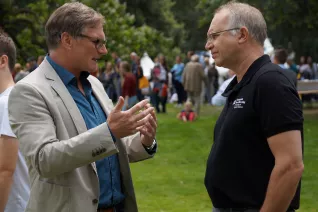
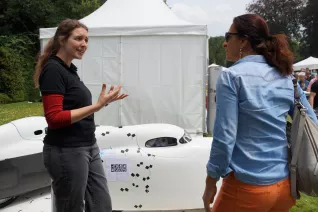
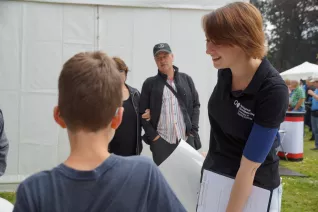
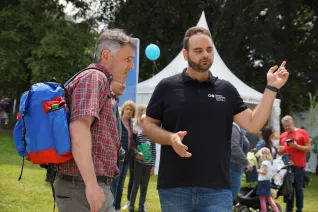
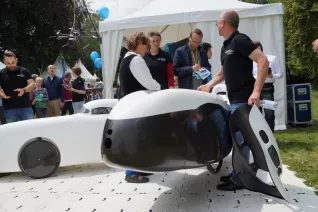
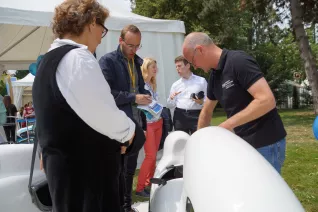
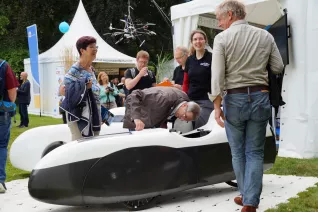
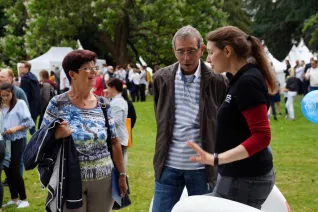
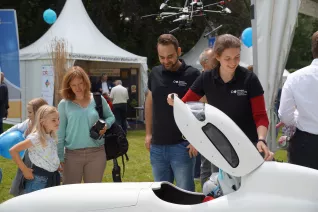
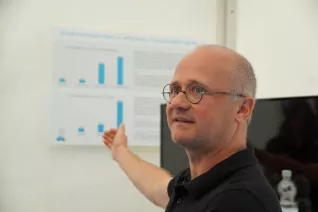
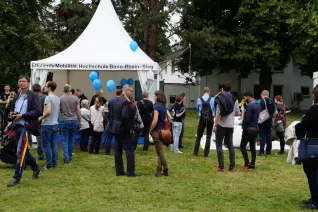
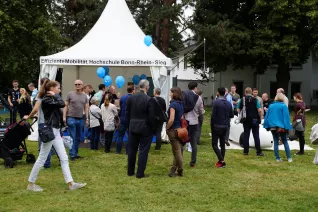
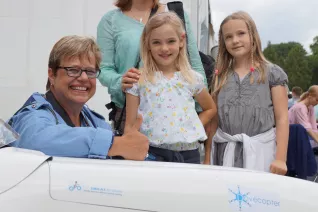
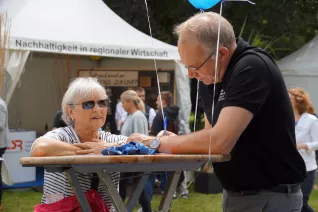
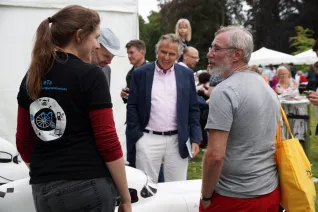
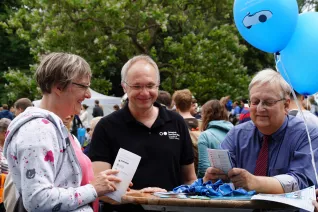
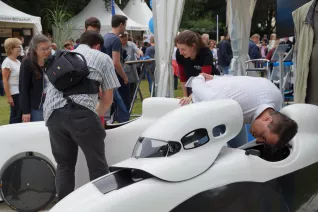
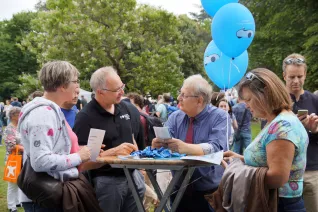

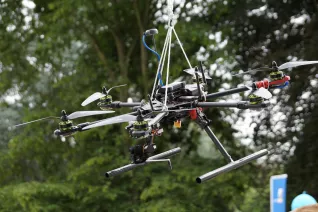
Online reporting in the context of the eTa research project
2018
Report in the Generalanzeiger (July 2018) about e-bike research:
Click to go to article
Report in Extra-Blatt (July 2018) about the visit of the Federal President to the eTa research stand during the open day at Villa Hammerschmidt:
Click to go to article
Post on the university website (July 2018) about the open house at Villa Hammerschmidt:
Click to go to article
Report in the Extra-Blatt (June 2018) about the participation at the Museumsmeilenfest at the Deutsches Museum:
Click to go to article
Post on the university website (June 2018) about participation in the Museumsmeilenfest at the Deutsches Museum:
Click to go to article
Post on the university website (May 2018) about the panel discussion at the specialty bike show:
Click to go to article
2018

Melanie Ludwig, Katrin Hoffmann, Stefan Endler, Alexander Asteroth, and Josef Wiemeyer (2018). Measurement, Prediction, and Control of Individual Heart Rate Responses to Exercise—Basics and Options for Wearable Devices. Frontiers in physiology, 9.
Vorarbeiten im thematischen Kontext von eTa
2017
- Christina Pakusch, and Paul Bossauer. User Acceptance of Fully Autonomous Public Transport. In Proceedings of the 14th International Joint Conference on e-Business and Telecommunications - Volume 4: ICE-B, (ICETE 2017) ISBN 978-989-758-257-8, pages 52-60. DOI: 10.5220/0006472900520060
Ausgezeichnet mit dem Best Paper Award.
2016
- Melanie Ludwig, Harald Grohganz, and Alexander Asteroth. A Convolution Model for Heart Rate Prediction in Physical Exercise. In Proceedings of the 4th International Congress on Sport Sciences Research and Technology Support (icSPORTS 2016), pages 157-164. DOI: 10.5220/0006030901570164
- Melanie Ludwig, David Schaefer, and Alexander Asteroth. Training Simulation with Nothing but Training Data - Simulating Performance based on Training Data Without the Help of Performance Diagnostics in a Laboratory. In Proceedings of the 4th International Congress on Sport Sciences Research and Technology Support (icSPORTS 2016), pages 75-82. DOI: 10.5220/0006042900750082
- Melanie Ludwig and Alexander Asteroth. Predicting performance from outdoor cycling training with the fitness-fatigue model. In Proceedings dvs-Workshop Modelling in Endurance Sports, pages 3–6. KOPS – The Institutional Repository of the University of Konstanz, 2016. URI: https://nbn-resolving.de/urn:nbn:de:bsz:352-0-371586.
Publications
2018

Melanie Ludwig, Katrin Hoffmann, Stefan Endler, Alexander Asteroth, and Josef Wiemeyer (2018). Measurement, Prediction, and Control of Individual Heart Rate Responses to Exercise—Basics and Options for Wearable Devices. Frontiers in physiology, 9.
Vorarbeiten im thematischen Kontext von eTa
2017
- Christina Pakusch, and Paul Bossauer. User Acceptance of Fully Autonomous Public Transport. In Proceedings of the 14th International Joint Conference on e-Business and Telecommunications - Volume 4: ICE-B, (ICETE 2017) ISBN 978-989-758-257-8, pages 52-60. DOI: 10.5220/0006472900520060
Ausgezeichnet mit dem Best Paper Award.
2016
- Melanie Ludwig, Harald Grohganz, and Alexander Asteroth. A Convolution Model for Heart Rate Prediction in Physical Exercise. In Proceedings of the 4th International Congress on Sport Sciences Research and Technology Support (icSPORTS 2016), pages 157-164. DOI: 10.5220/0006030901570164
- Melanie Ludwig, David Schaefer, and Alexander Asteroth. Training Simulation with Nothing but Training Data - Simulating Performance based on Training Data Without the Help of Performance Diagnostics in a Laboratory. In Proceedings of the 4th International Congress on Sport Sciences Research and Technology Support (icSPORTS 2016), pages 75-82. DOI: 10.5220/0006042900750082
- Melanie Ludwig and Alexander Asteroth. Predicting performance from outdoor cycling training with the fitness-fatigue model. In Proceedings dvs-Workshop Modelling in Endurance Sports, pages 3–6. KOPS – The Institutional Repository of the University of Konstanz, 2016. URI: https://nbn-resolving.de/urn:nbn:de:bsz:352-0-371586.
2018

Melanie Ludwig, Katrin Hoffmann, Stefan Endler, Alexander Asteroth, and Josef Wiemeyer (2018). Measurement, Prediction, and Control of Individual Heart Rate Responses to Exercise—Basics and Options for Wearable Devices. Frontiers in physiology, 9.
Vorarbeiten im thematischen Kontext von eTa
2017
- Christina Pakusch, and Paul Bossauer. User Acceptance of Fully Autonomous Public Transport. In Proceedings of the 14th International Joint Conference on e-Business and Telecommunications - Volume 4: ICE-B, (ICETE 2017) ISBN 978-989-758-257-8, pages 52-60. DOI: 10.5220/0006472900520060
Ausgezeichnet mit dem Best Paper Award.
2016
- Melanie Ludwig, Harald Grohganz, and Alexander Asteroth. A Convolution Model for Heart Rate Prediction in Physical Exercise. In Proceedings of the 4th International Congress on Sport Sciences Research and Technology Support (icSPORTS 2016), pages 157-164. DOI: 10.5220/0006030901570164
- Melanie Ludwig, David Schaefer, and Alexander Asteroth. Training Simulation with Nothing but Training Data - Simulating Performance based on Training Data Without the Help of Performance Diagnostics in a Laboratory. In Proceedings of the 4th International Congress on Sport Sciences Research and Technology Support (icSPORTS 2016), pages 75-82. DOI: 10.5220/0006042900750082
- Melanie Ludwig and Alexander Asteroth. Predicting performance from outdoor cycling training with the fitness-fatigue model. In Proceedings dvs-Workshop Modelling in Endurance Sports, pages 3–6. KOPS – The Institutional Repository of the University of Konstanz, 2016. URI: https://nbn-resolving.de/urn:nbn:de:bsz:352-0-371586.
Cooperation partners
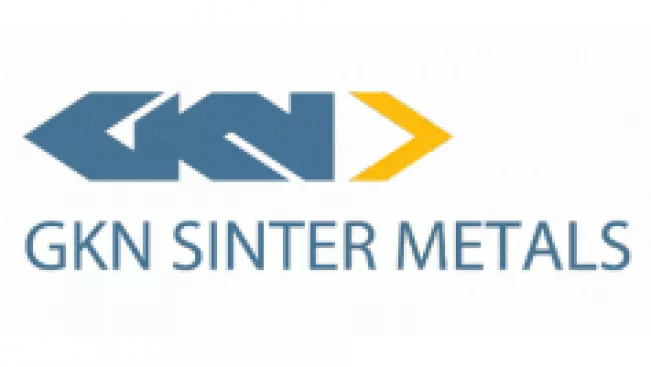
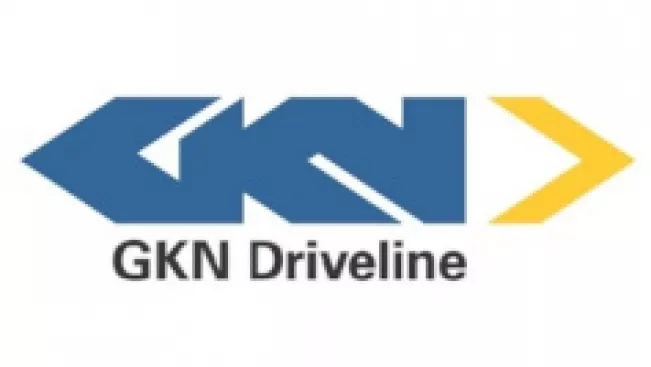

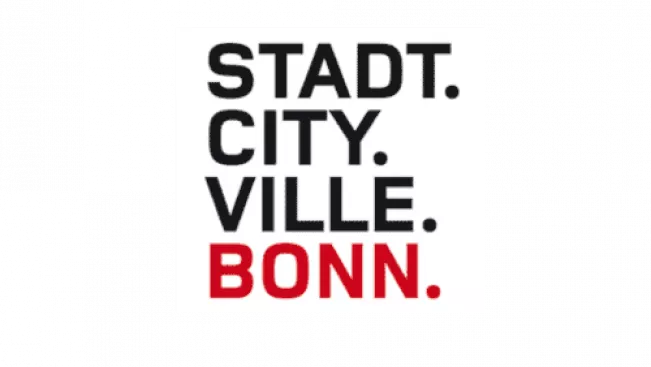
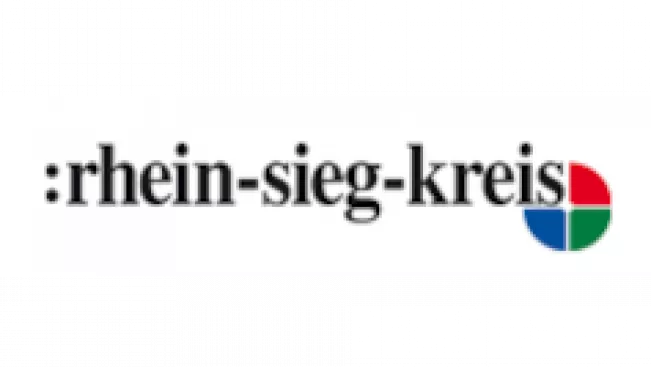




Sponsors


















































































